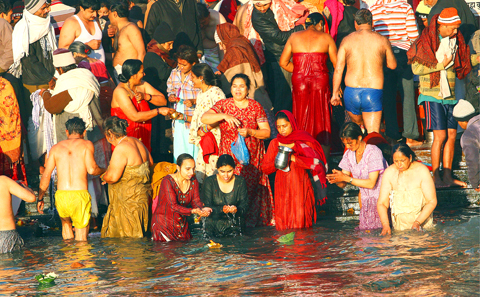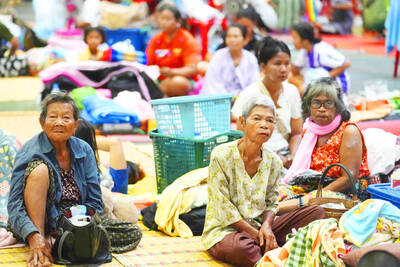Hundreds of thousands of Hindu devotees took a ritual bath in India’s holy Ganges River before daybreak yesterday as the world’s largest religious gathering got under way.
Braving chilly weather, hordes of pilgrims rose before sunrise in and around the northern town of Haridwar and made their way in darkness to the banks of the river to immerse themselves in the sacred waters.
They have come from all over India: families and couples, wealthy and poor, businessmen and farmhands, and itinerant sadhu or holy men draped in saffron-colored robes.

PHOTO: EPA
For Hindu devotees, the three-month Kumbh Mela festival offers them the chance to wash away their sins and break the karmic cycle of life and rebirth.
Even in a country where mass events are commonplace, the sheer size of the Kumbh Mela sets it apart.
Several million people were set to take part yesterday on the first of four particularly auspicious bathing dates, with millions more expected to pass through the sprawling festival encampment over the next 12 weeks.
“Your soul will be cleansed and you will be free from disease if you take such a bath during this period,” Sushant Rajsaid, a professional astrologist, said as he emerged from his own dip.
“The water is cleaner and has more natural power in the early morning,” he said.
Groups of women clustered on the final step of the ghat leading down to the river, unraveling their saris in the cold weather and using copper bowls to collect the water and pour it over their naked torsos.
As the sun rose, many stepped further into the river, immersing their entire bodies.
One woman in a bright red sari followed her ablutions by throwing necklaces of bright marigolds into the river where they were taken downstream by the current.
“The water was really cold,” said Bhawna Agri, 14, who traveled with her family from the neighboring state of Uttar Pradesh to attend her first Kumbh Mela.
“I only washed my hair and face and I’m still freezing,” she said, while shivering on the ghat steps.
The festival commemorates a mythical battle between gods and demons over a pitcher of the nectar of immortality.
During the struggle, a few drops of nectar fell in four different places: Allahabad, in the state of Uttar Pradesh, Haridwar in Uttarakhand, Ujjain in Madhya Pradesh and Nasik in Maharashtra.
The Kumbh Mela alternates between these four places and takes place every three years. Once every 12 years, an even larger Maha Kumbh Mela is held. The next will be in Allahabad in 2013.
The triennial festival also marks the only public gathering of hundreds of Naga sadhu, who otherwise live in relative isolation in mountains, caves and communes in the Himalayas and other regions of India.
Naked and generally covered in a layer of gray ash, they are regarded by devotees as earthly representatives of the gods because of their self-sacrifice and denial of the material world.
The Naga, carrying ritual swords and tridents, will lead ceremonies on the most auspicious bathing day of all on April 14 when the Mela draws to a close.
Soham Baba, considered the leader of the Naga, told reporters recently in Kolkata that they planned to use this year’s Kumbh Mela to highlight the issue of global warming.
“Sadhu like us who go up to the higher reaches of the Himalayas to meditate have a clear picture of how bad the situation is,” he said. “Pristine lakes and waterfalls that existed till a few years ago have dried up.”
Over the years, the festival has also become something of a tourist attraction, drawing foreigners who sometimes come to participate or simply witness the spectacle of so many people gathering for a common purpose.
“It’s amazing and it’s crazy. You can really feel the energy,” said Marco Necher, a retiree and amateur photographer from Liechtenstein.
At a separate location, seven Hindu pilgrims were killed yesterday in a stampede at the religious festival in West Bengal, a senior police official said.
The stampede happened as hundreds of devotees rushed for places on a ferry to take them to the pilgrimage site on Gangasagar island — where the Ganges flows into the Bay of Bengal.
“The rush became a stampede and seven people were killed,” said Surojit Kar Purokayastha, inspector general of the West Bengal police.

POLITICAL PATRIARCHS: Recent clashes between Thailand and Cambodia are driven by an escalating feud between rival political families, analysts say The dispute over Thailand and Cambodia’s contested border, which dates back more than a century to disagreements over colonial-era maps, has broken into conflict before. However, the most recent clashes, which erupted on Thursday, have been fueled by another factor: a bitter feud between two powerful political patriarchs. Cambodian Senate President and former prime minister Hun Sen, 72, and former Thai prime minister Thaksin Shinawatra, 76, were once such close friends that they reportedly called one another brothers. Hun Sen has, over the years, supported Thaksin’s family during their long-running power struggle with Thailand’s military. Thaksin and his sister Yingluck stayed

FOREST SITE: A rescue helicopter spotted the burning fuselage of the plane in a forested area, with rescue personnel saying they saw no evidence of survivors A passenger plane carrying nearly 50 people crashed yesterday in a remote spot in Russia’s far eastern region of Amur, with no immediate signs of survivors, authorities said. The aircraft, a twin-propeller Antonov-24 operated by Angara Airlines, was headed to the town of Tynda from the city of Blagoveshchensk when it disappeared from radar at about 1pm. A rescue helicopter later spotted the burning fuselage of the plane on a forested mountain slope about 16km from Tynda. Videos published by Russian investigators showed what appeared to be columns of smoke billowing from the wreckage of the plane in a dense, forested area. Rescuers in

‘ARBITRARY’ CASE: Former DR Congo president Joseph Kabila has maintained his innocence and called the country’s courts an instrument of oppression Former Democratic Republic of the Congo (DR Congo) president Joseph Kabila went on trial in absentia on Friday on charges including treason over alleged support for Rwanda-backed militants, an AFP reporter at the court said. Kabila, who has lived outside the DR Congo for two years, stands accused at a military court of plotting to overthrow the government of Congolese President Felix Tshisekedi — a charge that could yield a death sentence. He also faces charges including homicide, torture and rape linked to the anti-government force M23, the charge sheet said. Other charges include “taking part in an insurrection movement,” “crime against the

POINTING FINGERS: The two countries have accused each other of firing first, with Bangkok accusing Phnom Penh of targeting civilian infrastructure, including a hospital Thai acting Prime Minister Phumtham Wechayachai yesterday warned that cross-border clashes with Cambodia that have uprooted more than 130,000 people “could develop into war,” as the countries traded deadly strikes for a second day. A long-running border dispute erupted into intense fighting with jets, artillery, tanks and ground troops on Thursday, and the UN Security Council was set to hold an emergency meeting on the crisis yesterday. A steady thump of artillery strikes could be heard from the Cambodian side of the border, where the province of Oddar Meanchey reported that one civilian — a 70-year-old man — had been killed and